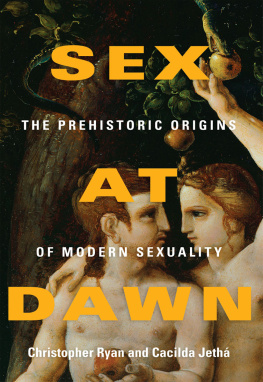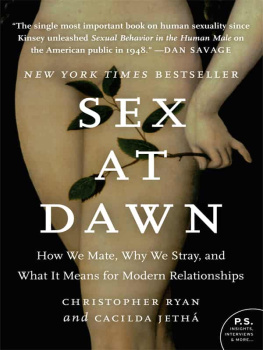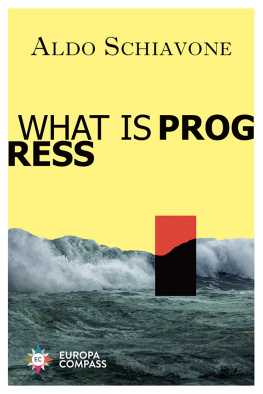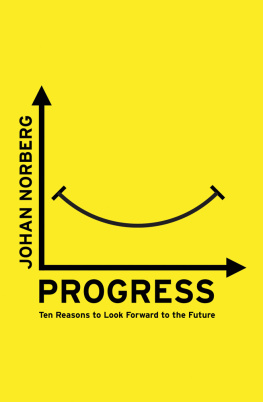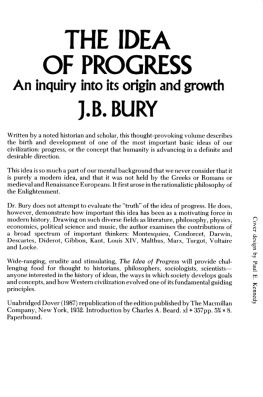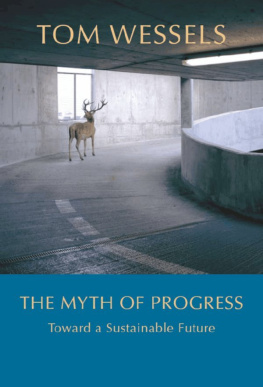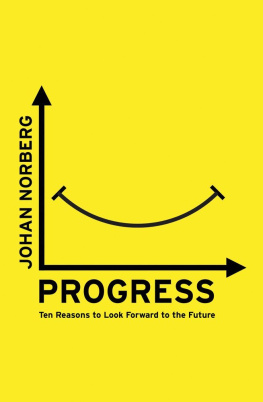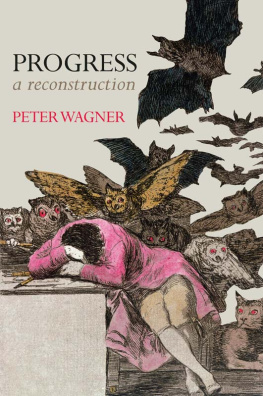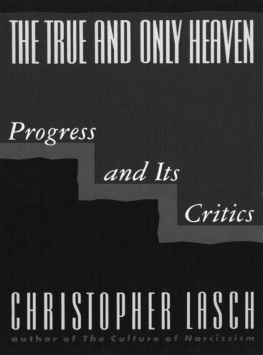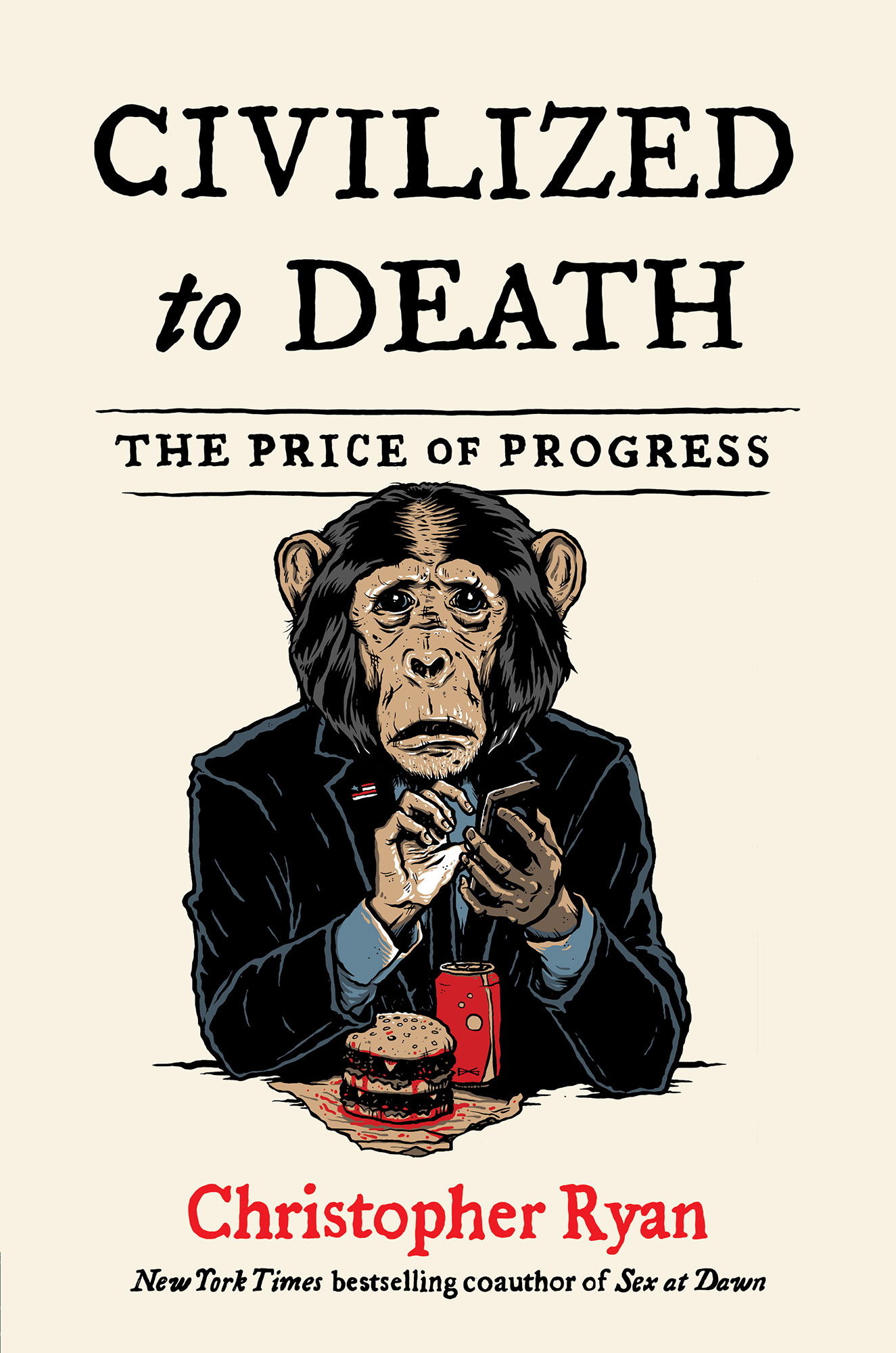Contents
Guide
ALSO BY CHRISTOPHER RYAN
Sex at Dawn: The Prehistoric Origins of Modern Sexuality
(with Cacilda Jeth)
A VID R EADER P RESS
An Imprint of Simon & Schuster, Inc.
1230 Avenue of the Americas
New York, NY 10020
www.SimonandSchuster.com
Copyright 2019 by Christopher Ryan
All rights reserved, including the right to reproduce this book or portions thereof in any form whatsoever. For information, address Avid Reader Press Subsidiary Rights Department, 1230 Avenue of the Americas, New York, NY 10020.
First Avid Reader Press hardcover edition October 2019
AVID READER PRESS and colophon are trademarks of Simon & Schuster, Inc.
For information about special discounts for bulk purchases, please contact Simon & Schuster Special Sales at 1-866-506-1949 or .
The Simon & Schuster Speakers Bureau can bring authors to your live event. For more information or to book an event, contact the Simon & Schuster Speakers Bureau at 1-866-248-3049 or visit our website at www.simonspeakers.com.
Interior design by Kyle Kabel
Jacket design by Alison Forner
Jacket illustration and lettering by Bruno Guerreiro
Author photograph Tintype, Joshua Lacunha
Library of Congress Cataloging-in-Publication Data is available.
ISBN 978-1-4516-5910-8
ISBN 978-1-4516-5912-2 (ebook)
To Frank and Julie
The friendly and flowing savage, who is he? Is he waiting for civilization, or past it and mastering it?
Walt Whitman
Introduction: Know Thy Species
Call me ungrateful. Ive got silver fillings in my teeth, artisanal beer in my fridge, and a world of music in my pocket. I drive a Japanese car with cruise control, power steering, and air bags poised to cushion me in an explosive embrace should I drift off. I wear German glasses that darken in California sunlight, and Im writing these words on a computer thats thinner and lighter than the book theyll eventually be printed in. I enjoy the company of friends Id have lost if they hadnt been saved by emergency surgery, and, for the last seventeen years of his life, my fathers blood was filtered through the liver of a man named Chuck Zoerner, who died in 2002. I have every reason to appreciate the many wonders of civilization.
And yet.
When the English author G. K. Chesterton first visited America, in 1921, his hosts took him to see Times Square at night. Chesterton stood staring in silence for several increasingly awkward moments. When someone finally asked him for his thoughts, Chesterton replied: I was thinking how beautiful this would be if I couldnt read.
Like Chesterton, we can read the signs, and theyre not good. The insistent, flashing ads are steadily losing their power to distract us from what many know and most suspect: Were approaching the end of the road. Belief in progressthe promise and premise of civilizationis melting away like a glacier.
But what about antibiotics and airplanes, womens rights, gay marriage? True enough. But upon closer inspection, many of the supposed gifts of civilization turn out to be little more than partial compensation for what weve already paid, or they cause as much trouble as they claim to solve.
Most of the infectious diseases vaccines protect us from, for example, were never a problem until humans began living with domesticated animals from which pathogens jumped over to our species. Influenza, chicken pox, tuberculosis, cholera, heart disease, depression, malaria, tooth decay, most types of cancer, and just about every other major ailment responsible for causing massive suffering to our species derive their lethality from some aspect of civilization: domesticated animals, densely populated towns and cities, open sewers, food contaminated with pesticides, disruptions to our microbiome, and so on.
Within just a few years of unlocking the miracle of flight, pilots were flying with one hand while tossing bombs on civilians with the other. And only in the most progressive modern societies are LGBTQ people and women regaining the acceptance and respect they typically received in most foraging societies. Reports of progress have a tendency to be wildly overstated and uncritically accepted, while anyone who questions the benefits of civilization is liable to be dismissed as cynical, utopian, or some hybrid of both.
An era can be considered over, said Arthur Miller, when its basic illusions have been exhausted. Progress, surely the basic illusion of our era, is spent. Dystopian scenarios loom ever larger as fisheries collapse, CO2 levels rise, and clouds of radioactive steam billow from fail-safe nuclear plants. Oil gushes into oceans, mutating pathogens overwhelm the last effective antibiotics, and the living dead stumble through our collective unconscious. Each successive year is the hottest on record, and the next undeclared war ignites from the embers of the previous while political parties nominate charlatans who cant agree on whats happening, much less what to do about it. Despite the marvels of our ageor maybe partly because of themthese are deeply troubled times.
Its common to wonder what sage advice an emissary from the future might bring back to help us choose the best path forward. But consider the opposite scenario. How would a time traveler from the prehistoric past assess the state and trajectory of the modern world? She would no doubt be impressed by much of what she encountered here, but once her amazement at mobile phones, air travel, and self-driving cars subsided, what would she make of the substance and meaning of our lives? Would she be more awed by our doodads or dismayed by what weve left behind in our rush toward an increasingly precarious future?
This question isnt as hypothetical as it seems. Missionaries, explorers, adventurers, and anthropologists have been consistently confused and disappointed by indigenous peoples rejection of the comforts and constraints of civilization. Why should I learn to farm, asked a !Kung San man, when there are so many mongongo nuts in the world? In a letter to a friend, Benjamin Franklin noted how little interest Indians had in joining civilization: They have never shown any inclination to change their manner of life for ours. When an Indian child has been brought up among us, taught our language and habituated to our customs, yet if he goes to see his relations and make one Indian ramble with them, there is no persuading him ever to return. And when white children got a taste of Indian life (generally due to having been kidnapped), they also preferred it, according to Franklin. After their rescue, in a short time they become disgusted with our manner of life, and the care and pains that are necessary to support it, and take the first good opportunity of escaping again into the woods.
Charles Darwin saw firsthand how difficult it was to sell native people on civilization. Passing through Tierra del Fuego on the Beagle, he was amazed by what seemed to him to be the squalor and degradation of the people living at the cold and stormy southernmost tip of the Americas. In a letter to a friend, Darwin wrote: I have seen nothing, which more completely astonished me, than the first sight of a Savage; It was a naked Fuegian his long hair blowing about, his face besmeared with paint. In his journal, Darwin wrote, I believe if the world was searched, no lower grade of man could be found.
On an earlier trip, the Beagle


